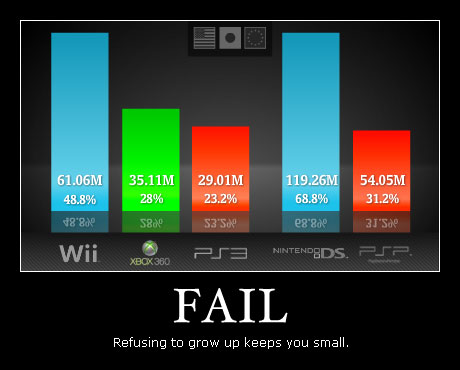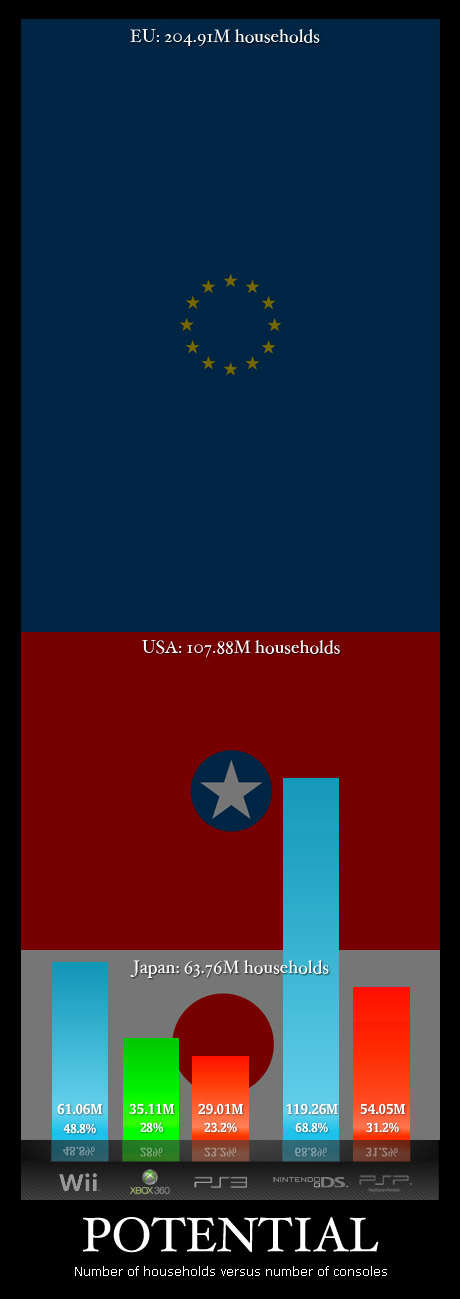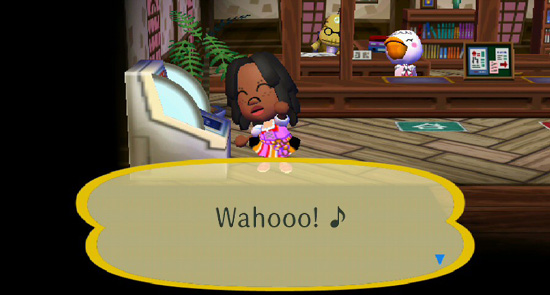2009 Was another triumphant year for the Wii and DS. Nintendo has successfully introduced the general public to playing games on computer hardware. But this is far from a triumph for the medium of videogames.

Source: VGChartz
People like playing games
Nintendo didn’t do much. But they were smart about it. Rather than trying to start a revolution with a brand new medium, they had a good look at the way people play today and made digital versions of those activities. They basically made it possible for people to play the kinds of games they were already enjoying, on their television sets.
Some may celebrate this as the breakthrough of videogames into the mainstream. I don’t. I hope this is just a temporary setback in the evolution of the medium. I’m not a big fan of huge corporations, but I do share, to some extent, the dreams that Sony and Microsoft have about the interactive medium. With them, I see videogames as the great new art form of the new century. Videogames as the cinema, television and pop music of the young millennium.
It’s not about getting as many people as possible to play games (they were already playing games, have been doing that since the dawn of time, there’s nothing new here). It’s about giving our times, our cultures a medium that we can find ourselves in, that we can express ourselves in. A medium that can help us understand our world, and that can help define it. Just as literature and cinema have done in the past.
Nintendo does not share this dream. They never have. Mario and Zelda and Pokemon are nothing like Scarlett O’Hara, Jean-Luc Picard or Romeo and Juliet. Nintendo makes games. It’s what they do. And they’re successful at it.
But the dream of Sony and Microsoft reaches a lot further. They want to be part of your life style, part of your culture, embedded in your society. They want the experiences you have on their systems to be meaningful and dramatic. They’re not selling fun. They’re selling mystery and wonder, spectacle and discovery, experiences you have never had before.
And they failed. Massively. So much so that they are hurrying to try and pick some crumbs left behind by Nintendo by quickly introducing some motion sensing hardware to their systems. The irony of the cats following the mouse would be amusing if it weren’t so sad.
The failure of the nerds
Nintendo got one thing right. It’s an extremely obvious thing. But Sony and Microsoft continuously fail at recognizing it. Nintendo realized that the mainstream audience does not consist of nerds -in fact, one could argue that that is the very definition of a mainstream audience. As soon as they did, they were instantly successful.
There’s a lesson to be learned here. The “hardcore industry” has always insisted that games were great just as they were, that it was just a matter of time before the masses would start playing them. They were basically expecting that everyone would become a nerd. Obviously this did not happen. And it never will. If only because language doesn’t allow it. Nerd and mainstream are polar opposites.
The games themselves were not the problem. Any expert will point out that there is not a lot of difference between Tic Tac Toe and Gears of War, or between Super Mario and Devil May Cry. But Nintendo -finally- realized that people don’t play games for the pretty characters or the great stories but for the systems of interaction that they allow us to engage in. And those systems are far better served by simple graphics and sounds than by elaborate theatrical displays.
The games that Sony and Microsoft have been promoting were basically the digital equivalent of chess sets with pieces made to look like characters from Star Wars or Lord of the Rings. Only 1337 H4x0rz would actually believe they were attacking the Death Star while playing a match with such a set. Most people simply prefer to play a straight-up game with traditional pieces.
Games and… something else?
So now we’re at a crossroads. Do we give up the dream of a new medium for a new century and follow Nintendo’s example of simply giving people what they expect? Or do we strive for greatness and realize the potential of this marvellous new technology?
Nintendo has made one thing clear: people want to play games. But only if the games are simple and straightforward. They don’t want pretty pictures on their games or sweeping stories. They just want to have fun. However, the same people who are having fun with the Wii, also enjoy a visit to the cinema. They also love reading books. Their eyes fill with tears when listening to their favourite pop tune. And they’re hooked on several television shows. These people are not insensitive to narrative, emotion or meaning. They just don’t want to mix those experiences with playing games.
So the solution seems clear. If we want to realize the dream, if we want to give the new century the medium it deserves, the medium it needs, the medium it is sorely lacking, we need to stop wasting this technology on games!
It’s a difficult step to take. Because we love our games. We love battling our giant demons and riding our fire breathing dragons. We love planning our global wars and feeling the rush of victory against improbable odds. But let’s face it: we’re nerds. And only nerds like this kind of stuff. In the clear light of day, a sober eye quickly recognizes these videogames as the superb kitsch they are. Such videogames appeal exclusively to an educated elite and/or marginal ghetto.
This doesn’t mean that it is impossible to create interactive entertainment for people outside of the core niche. People still love their stories, and they still need fiction to help them deal with reality. And people also love to interact with their machines. That has ceased to be a geek exclusive a long time ago -if it ever was one. We just need to work a bit harder.
Instead of simply skinning ancient game routines with high tech spectacle, we need to sit down and have a good look at our medium-to-be and understand what is so uniquely interesting about it. Instead of trying to use new technology to do old tricks, we need to figure out what it is exactly that we find so fascinating about playing on a computer. And translate this to new audiences. This is not an easy thing to do, and it will take a lot of trial and error. But the rewards are great and the accomplishment will completely overshadow any of Nintendo’s current successes.
Down or up?
Will Sony and Microsoft realize this any time soon? I doubt it. The fight seems to have moved from the living room to the play room, from the media store to the toy store. And they will battle it out right there, on the brightly coloured carpet, in between the Barbie dolls and plastic machine guns, while the rest of the world is aching for a new medium, a medium that can deal with the complexities of today’s society, a fiction that can help us cope with our confusing realities.
I feel we have a responsibility here. A duty, even. We have a choice. We can continue to make geek kitsch for the niche audience of hardcore gamers. We can follow Nintendo and make simple games with pixels and code instead of cardboard and plastic. Or we can do something important, something meaningful, something that actually makes a difference.
Let’s end with a long picture:

Sources: VGChartz, Worldmapper, Wikipedia



 ). With a technology that is so versatile and powerful, why should we limit our productions and enjoyment to the single format of games, a format that has been around for centuries and doesn’t even need computers to exist?
). With a technology that is so versatile and powerful, why should we limit our productions and enjoyment to the single format of games, a format that has been around for centuries and doesn’t even need computers to exist?



